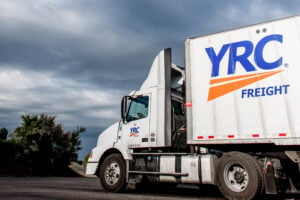For more than 20 years, Stephanie Savard worked in the tech world. When she reached her 40s and 50s, she felt an invisible force pushing her to the outside her area of expertise. Frustrated at the contrast between the way some of the tech companies she’d worked with would tout acceptance and diversity, versus the reality of how they were operating, she decided to forge a new path. Facing ageism and discrimination due to being a transgender woman, she threw in her tech towel and got to driving.
“I’ve always loved driving, and I’ve always loved traveling,” Stephanie says.
Transport seemed like the perfect solution for Stephanie, who was eager to earn more in her driving job than she had in years in the tech world. Once she’d started driving, she was surprised at how hospitable her new industry was – no ageism, no gender discrimination, and no pay gap.
“It was surprising to see that in trucking,” Stephanie remembers, reflecting on the perceived irony of the situation.
Stephanie’s partner of 26 years, Christine, eventually joined her on the road as well, leaving a teaching career that was quickly becoming a paltry endeavor compared to the success Stephanie was finding on the road. Today, the pair team up to drive long distances without needing to stop for sleep.
“It’s nice because we can finally just be together all the time,” says Stephanie, “we’ve got a sleeper unit and while one drives, the other rests.”
The pair can make it from Montreal to California in about two and a half days, an efficiency factor that helps them quickly deliver the refrigerated produce they typically carry from California back to Quebec and Ontario. The bulk of the goods they carry go this direction – California northward – so anything picked up on the road south serves as ancillary income that makes each trip more lucrative and efficient.
Transporting refrigerated goods certainly has its fair share of challenges – primarily weather and road conditions that can cause delays.
“When you’re driving through Wyoming or someplace really cold, like negative 10, mechanical breakdown means you have very little time – 30 to 60 minutes – before the cargo freezes and becomes spoiled,” she says about carrying delicate cargo like fresh produce.
Together, Stephanie and Christine spend their days in their 53-foot tractor-trailer unit, exploring North America along the way. Together, they’re proving the industry isn’t just open to women – it’s a welcoming, fruitful and downright pleasant space for women.
“It’s the last thing you’d expect,” Stephanie says.
See Stephanie’s story here:




